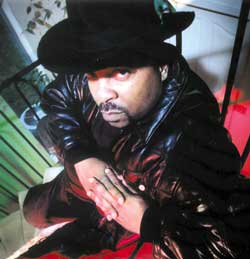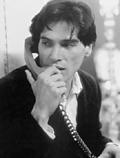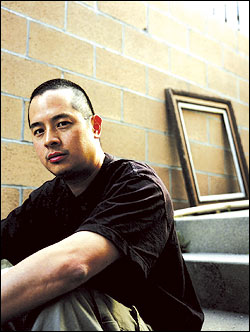BORN ANTHONY RAY, Seattle native Sir Mix-a-Lot is the Northwests biggest-ever hip-hop artist. Mostly, this is due to one song: Baby Got Back, a single from Mixs third album, 1991s Mack Daddy, that went from club anthem to MTV staple and cemented the rappers rep as a one-hit wonder. But hes not. The cartoonishness and huge success of his biggest hit has overshadowed the fact that Mix-a-Lot made plenty of hits before Back and was one of West Coast hip-hops first major artists; his first single, 1987s Posse on Broadway, appeared the same year as N.W.As first singles, and 1989s Seminar went platinum and spawned the immortal My Hooptie, probably Mixs greatest single and one of the all-time hip-hop car odes, albeit one addressed to a junkyard-ready jalopy: Six-nine Buick, deuce keeps rollin/One hubcap cause three got stolen.
In the decade-plus since Baby Got Back, Sir Mix-a-Lot has strayed from the public eye, releasing albums sporadically, and, as he points out below, trying to move on from the long shadow cast by Baby Got Back. His new album, Daddys Home (Rhyme Cartel/iMusic)his first since 1996s Return of the Bumpasaurusis, as usual, a party album that plays off the rappers longtime pimp persona, but he spends as much of the album poking holes in the role as playing it straight.
The Jukebox Jury was conducted at the Seattle Weekly offices, with Mix driving in from his home in the suburbs.
De La Soul: Plug Tunin (1988) from Timeless: The Singles Collection (Tommy Boy/Rhino)
Sir Mix-a-Lot: I remember when I heard this song, I thought, These guys are gonna be around a while. Remember, back in 88, it was like, Bitch, ho, motherfucker, suck my dick. To me, from 8995, N.W.A., Nuthin but a G Thang, all that stuff fell right in that window. You had groups like Public Enemy and X-Clan to kind of combat that. But gang violence was peaking in the early 90s, so this was refreshing. People wanted me to talk about [gangs], but I was like, Dude, I was around pimps, not gangsters. Im not gonna talk no gang shit.
Seattle Weekly: You put your first couple of records out on a local indie label, NastyMix. Was it difficult to get a label off the ground here back then? There were local indie labels, but they mostly released rock.
Sir Mix-a-Lot: It was difficult. Youd walk in [a record distributors] door and say, Weve got a rap record from Seattle, and as far as theyre concerned, instantly credibility goes out the window. This is before Microsoft went nuts; people thought Seattle didnt have paved roads. Especially being a rapper, people were like, How did you do rap music coming from Seattle? It must be hard. Like I had a bunch of white people outside my house with picket signs: Take rap back to Africa! We had to go around mainstream hip-hop. I call it selling backwardswe went to the audience furthest from us and then came back.
Now its the other way around. I remember getting a phone call from Busta Rhymes out of nowhere: Dude, Im in downtown Seattle, I need some bud. Everybody knows weve got weed. I was in Humboldt County; there were guys comparing their weed to our weed.
Seattle Weekly: You also did One Time Got No Case, a song about police harassment. People forget that was the first single off Mack Daddy.
Sir Mix-a-Lot: Yeah, Baby Got Back came out and smothered it. It was the way I was living around here; back then, cops didnt know who I was. Now, cops are my age: Oh, Mix, whats up, dude?
Bad Brains: Pay to Cum (1981) from Banned in D.C. (Astralwerks)
Sir Mix-a-Lot: Im not digging this. Its a little happy.
Seattle Weekly: Its Bad Brains, an all-black hardcore band from D.C.
Sir Mix-a-Lot: It sounds way happysuburban-white-kid-complaining-because-the-pool-is-dirty kind of music. And Im a rock fanaticI just finished listening to Godsmack in the car.
Seattle Weekly: When you were starting out, it was around the same time as the early Sub Pop groups. Did you feel any kind of affinity with them?
Sir Mix-a-Lot: Not really, although our paths paralleled in a weird way. I didnt really feel it until it was done. I remember standing outside a Grammy party, and Alice in Chains were there, Pearl Jam, Nirvana. It was like a reunion, but wed never met.
Amy Rigby: Are We Ever Gonna Have Sex Again (2003) from Till the Wheels Fall Off (Signature Sounds)
Sir Mix-a-Lot: [Laughing at the line Whatever happened to babe and stud?/Too much KFC and Bud] That is hilarious. That was very different, because you know, I come from a world where everybodys bragging on how successful their sexual escapades are, but that was cool and realistic.
Seattle Weekly: Your new album seems pretty realistic in a similar way.
Sir Mix-a-Lot: Well, I grew up. Im still funny on some of the tracks, but at the same time, I didnt want to make a record and be talking about 15 cars and who has the biggest dick. It gets old pretty quick.
Caf頔acuba: Qu預asora (2003) from Cuatro Caminos (MCA)
Sir Mix-a-Lot: [The song is sung entirely in Spanish.] I wish I knew what theyre saying. I love this, but they might be saying, I go up to the mall with my friends and buy Sno-Kones.
Seattle Weekly: Did you always listen to rock growing up?
Sir Mix-a-Lot: If it was on the edge.
Seattle Weekly: Like the heavier stuff?
Sir Mix-a-Lot: Not necessarily. I was listening to Devo. But then you had all these Whitesnakes in their little tight pants and big hair. I didnt really reconnect with rock until I went to the Grammys and saw Metallica play in 92.
Seattle Weekly: How did Subset [Mixs project with the Presidents of the United States of America] come about?
Sir Mix-a-Lot: Someone had the idea we should get together and cover a Hendrix track. So we got together and talked about how we hated the record business but loved music, and we did a song about it called Addicted to the Fame. We went on tour, but the record never came out. There were also some creative differences: Im listening to Korn, and theyre listening to 60s stuff. I appreciate 60s stuff, but Hendrix wasnt listening to Count Basie. I think the need to go back and sound vintage is a little stupid. We can look at what was but not try to be it.
Lord Tariq & Peter Gunz: D骠 Vu (Uptown Baby) (1997) from The Source Presents Hip-Hop Hits 2 (Universal)
Sir Mix-a-Lot: I love this chorus. Thats how you make a hit record: Get your hook in there and then move on. Theyre double-speed rhyming over half-speed tracks.
Seattle Weekly: When you started off, a lot of people were rhyming a lot slower.
Sir Mix-a-Lot: So was I. Raps come a long way.
Seattle Weekly: Do you feel the need to compete with the way other rappers rhyme now?
Sir Mix-a-Lot: Not necessarily increasing my tempo, but I feel its important, especially for old-school cats, to upgrade their skills. Guys that are still like, [one syllable at a time] I-like-big-butts-and-I-cannot-lie, its like, goddamn, there are some guys still doing that. When I did it in 92, it was sarcasticit sounded old then.
Seattle Weekly: Whats the secret to staying around in rap?
Sir Mix-a-Lot: Being willing to lose your record deal. If you have a hit, theyre going to make you do that hit over and over again. Youve got to grab a rope and hang onyoure probably never going to be as big as you were, but you can reinvigorate your foundation with cool tracks. I got a lot of pressure on [Daddys Home] to do Baby Got Back again. I tried that when I did [1994s] Put Em on the Glass. That shit was horrible. I felt bad doing it.
I always held back lyrically. [Former producer] Rick Rubin always wanted to hear very articulate, literal, see-Spot-run rhymes. So people always assumed, This cat cant rap. So when I let him hear the Daddys Home lyrics back then, he was like, I dont think people want to hear you like that.
If you watch it, the music business as we know it is over. I think its good$20 for a CD is ignorant; guys paying $50 to watch a rapper play for 15 minutes at the Paramount is stupid. That shit has to stop. What youre gonna have is guys like Tek 9, whos totally independent, sold 350,000 records out of Kansas City, and hes a millionaire. Thats where Im at mentally.








